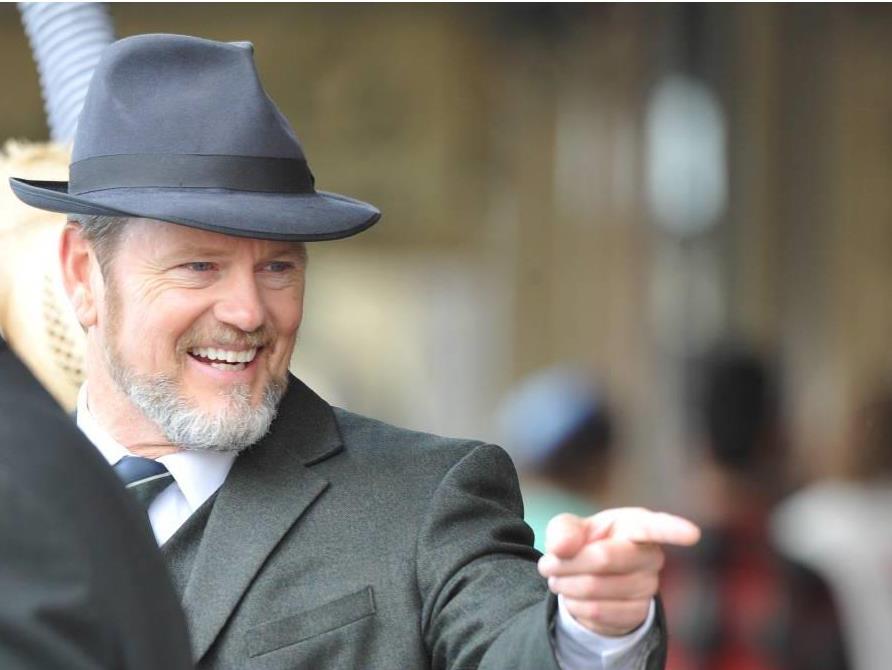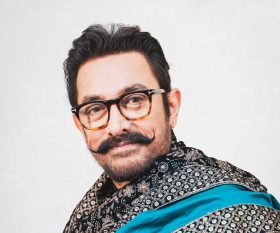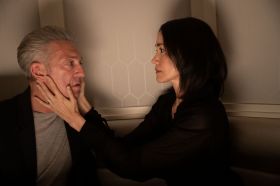Craig McLachlan as the ABC audience saw him. Image: The Dr Blake Mysteries.
We asked Ken Parish to cross-post this analysis on his blog, Club Troppo, which will accrete its own range of comments.
The #MeToo sexual harassment tsunami generated by the unmasking of American screen industry heavyweights Harvey Weinstein and Kevin Spacey has hit Australian shores with a vengeance. As an old Monty Python sketch observed: ‘Nobody expects the Spanish Inquisition!’. Don Burke, Geoffrey Rush and now Craig McLachlan certainly didn’t.
The behaviour of one or more of them may deserve summary public excoriation but then again it may not. At this stage we simply don’t know. As American pundit Andrew Sullivan notes:
‘The early exposure of Roger Ailes, Bill O’Reilly, and Harvey Weinstein — achieved by meticulous, scrupulous journalists and smart, determined women — quickly extended to more ambiguous and trivial cases. Distinctions among many different types of offences — from bad behavior at private parties to brutal assault and rape of employees and co-workers — were being instantly lost in the fervor. Punishment was almost always the same — social ostracism and career destruction …’
Without minimising their seriousness, the published McLachlan allegations don’t belong at the Weinstein end of the scale. However there are other aspects of the situation that haven’t really been publicly discussed at all. What happens to the entertainment industry content producers whose stars are condemned by a random process of trial by mainstream and social media?
The McLachlan claims relate to a 2014 tour of the stage musical The Rocky Horror Show produced by The Gordon Frost Organisation (GFO) and alleged behaviour on the set of December Media’s long-running flagship drama series The Doctor Blake Mysteries. But will the consequences for the respective production companies fit the ‘crimes’?
Some producers are corporate juggernauts while others are quite small and vulnerable. Live theatre companies can usually fairly easily replace a star who becomes ill or commits career hara kiri. They have a different audience each night and the principal actors have understudies. By contrast, producers of a long-run TV drama series are in a more invidious position. Their core audience is habituated, tunes in every week and sometimes regards the stars almost as members of the family. Such a show can survive the introduction of a new actor playing the lead role if its producers have time to plan and script the transition. The seemingly eternal British whodunnit series Midsomer Murders is an example. But what if the forced personnel change is sudden and surrounded by controversy? What if the series has been previously cancelled by the ABC, rescued by the Seven Network but not yet in production? What if contractual obligations with the network require the end-product to be delivered with a specified star (in this case McLachlan) in the lead role?
At least four of the Rocky Horror complainants have identified themselves in the media. Their allegations if proven may well amount to sexual harassment under federal and state anti-discrimination legislation and in some cases bullying under the Fair Work Act 2009 (Cth). Some may even be indecent assaults. At least one claims to have been threatened by McLachlan. Two say that they informally complained to GFO at the time in 2014 although that seems to be denied. All of them complained more recently through their lawyers. The letter contained reasonable particulars of the allegations and sought only an internal investigation and dispute resolution process. The complainants only went public when that request was denied and GFO instead threatened defamation proceedings against them. At least two have subsequently made complaints to police. And yet the current Rocky Horror season continues uninterrupted with McLachlan’s understudy in the Frank-N-Furter role. It seems unlikely that GFO will suffer significant commercial damage.
December Media’s situation looks rather more uncertain, even though neither of the Doctor Blake informants whose allegations have so far been published by Fairfax/ABC actually claim that they themselves were assaulted or harassed. Instead they claim to have witnessed behaviour that they regarded as harassment. One was an extra who told the ABC and Fairfax that in 2013 he saw McLachlan push his crotch into a female crew member and make a lewd comment. The extra isn’t named, nor is the female crew member, who as far as we know never complained to anyone.
The other informant, and primary source of the published Doctor Blake allegations, is another unnamed crew member who worked on the program for a bit over two months in late 2016:
‘A lot of the time it was sexual innuendo, sexual joking, talking about sex and that filtered through,’ he said.
‘And people would laugh and say, ‘It’s all a big joke’.’ …
‘He’s a star and other people do the same kind of thing because he sets the tone of the place. In my opinion, a lot of it looked like sexual harassment.’
Some of that conduct might well amount to sexual harassment if repeatedly directed at particular individuals, but that claim isn’t made. Moreover, even then it would only amount to harassment if the object of the conduct subjectively experienced it as such. Perhaps some did indeed feel harassed but refrained from complaining for fear of adverse career consequences because McLachlan was the star. We simply don’t know.
It is equally possible that a generally accepted culture of bawdy behaviour and sexual banter had developed over the four year period the cast and crew had been together before the informant briefly joined their ranks. The assertion that McLachlan was somehow wholly responsible for that culture ‘because he sets the tone of the place’ makes little sense on its face. The cast included both Nadine Garner and John Stanton (for the show’s first three years). Both are more experienced actors than McLachlan and seem unlikely to have been intimidated from complaining if they felt he was overstepping the mark of acceptable behaviour in an environment where cast and crew were intimately familiar with each other from working together for years, and had no doubt developed rituals to stave off boredom during long days of multiple takes and endless rehearsals.
Similarly, the informant crew member recounts an incident where McLachlan is said to have placed a banana in his crotch and then thrust it into the face of an actress and the series director. Again neither complained at the time. It seems unlikely that the series director at least would have refrained from complaining or taking action had he felt sexually harassed.
The informant crew member also claims that McLachlan once snuck up behind a camera assistant on set and ‘starts humping her – like a dog would hump a leg’, and that he himself once offered McLachlan a drink during a break only to be told ‘No thanks, I’d prefer a hand job.’ The former incident would certainly have been an indecent assault if it occurred and was non-consensual, but again we simply don’t know. As for the incident involving the informant himself, it might well be sexual harassment if he had subjectively felt harassed, particularly if he believed that McLachlan was asking him to supply a personal happy ending to his coffee break. However the Fairfax/ABC story doesn’t suggest he felt harassed or interpreted the words in that way. It was no doubt crude, unfunny ‘sexual innuendo, sexual joking’ but that isn’t assault nor does it necessarily constitute harassment.
The published allegations look rather flimsy. It is unlikely that Fairfax and ABC lawyers would have approved them for publication had it not been for the earlier more extensive and corroborated Rocky Horror allegations. Once they became public McLachlan became ‘fair game’ from a media viewpoint. The story became ‘defendable’ because they could be relatively confident that McLachlan wouldn’t sue, and if he did he would be met with a range of defences including fair comment, relying in part on the earlier similar allegations already in the public domain.
However, as the informant crew member conceded and December Media emphasised as soon as it became aware of the allegations: ‘We reiterate that until this afternoon December Media had received no complaints from the set of Doctor Blake 5.’ Fairfax/ABC’s principal informant claims that ‘all those in charge were often on set and could see [McLachlan’s behaviour] for themselves’. But to what extent is that true? Moreover, it begs the central question of whether and to what extent that behaviour was experienced by cast and crew members as harassment or just occasionally tiresome behaviour that they accepted or at least tolerated as within the bounds of an evolved workplace culture.
The whole sorry tale is an example of what renowned Canadian author Margaret Atwood recently analysed in a fairly similar context:
‘The #MeToo moment is a symptom of a broken legal system. All too frequently, women and other sexual-abuse complainants couldn’t get a fair hearing through institutions – including corporate structures – so they used a new tool: the internet. Stars fell from the skies. This has been very effective, and has been seen as a massive wake-up call. But what next? …
If the legal system is bypassed because it is seen as ineffectual, what will take its place? Who will be the new power brokers? … In times of extremes, extremists win. Their ideology becomes a religion, anyone who doesn’t puppet their views is seen as an apostate, a heretic or a traitor, and moderates in the middle are annihilated. ‘
December Media has now announced an independent but private investigation into the allegations, appointing workplace consultant Fiona Bigelli to speak to cast and crew from the series. Fairfax/ABC has delivered a brief of the allegations, which may well contain more material than has so far been made public. Hopefully the Seven Network and any public sector funding bodies will suspend final judgment until the outcome is known. December Media is a respected Australian producer of drama and documentaries. Both it and Doctor Blake deserve to survive, with or without Craig McLachlan.
From a wider perspective, the McLachlan affair brings into focus the need for more fulsome regulations mandating processes and ‘whistleblower’ protections for dealing fairly and sensitively with allegations of abuse, assault or bullying, especially in entertainment industry workplaces. It is an industry where employment is almost by definition insecure and often intermittent. The old clichéd predatory producer’s line ‘you’ll never work in this town again’ is a very real fear for many. It certainly appears to have been a reason why the Rocky Horror complaints weren’t made (at least formally) until recently. To what extent Doctor Blake cast or crew may have held similar fears will hopefully be explored by Fiona Bigelli, as will the adequacy of December Media’s complaint-handling processes.





